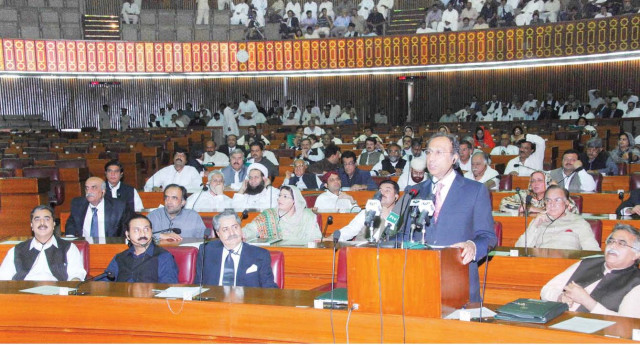Dare we dream of reforms?
On Friday the minister laid out his agenda which was ambitious to say the least.

Finance Minister Abdul Hafeez Shaikh seems to be on the verge of finally responding to his critics by laying out a series of specific proposals for structural reforms which, if he is successful in implementing, would transform Pakistan into a far more dynamic economy than it is today.
In the past, Shaikh had been criticised for sounding like he was commenting on policy rather than shaping it. Many observers saw him as too cautious to push through serious reforms. Yet on Friday evening, the minister laid out his agenda which was ambitious to say the least.
It envisions a government that measures its own productivity, that sells off most state-owned enterprises and that is focused on developing opportunities for the burgeoning young population.
Observers will note that the general principles behind many of the minister’s proposals are not new, but for the first time, the minister outlined specific policy items, some of which he has already started on and made nearly all of his budget speech about them rather than mixing them with a significant dose of populism.
The most obvious was the deregulation of the energy sector, which has already begun to take place. The Oil and Gas Regulatory Authority (Ogra) has been given the power to set oil prices on their own, based on a technical formula rather than a cabinet decision subject to political pressure. The minister has already proposed allowing the National Electric Power Regulatory Authority (Nepra) to independently set tariffs for electricity as well.
His proposals on changing zoning laws in large cities in order to focus on creating more dynamic urban magnets of economic growth, for instance, is straight out ‘Triumph of the City’, a book written by Harvard economist Edward Glaeser, who argues that well-managed cities are necessary for the economic progress of any country in the 21st Century.
The finance minister also explicitly accepted criticism levelled by the State Bank of Pakistan that the government’s borrowing from the central bank is the single biggest cause of inflation. Shaikh promised that the federal government would rein in its monetisation of the national debt – a euphemism for printing money.
While these promises are made every year, the government has given the central bank additional power to refuse to lend to the finance ministry through the State Bank Act of 2011, lending some credence to those claims.
In other areas, however, the government remained as cautious as ever. With regard to civil service compensation, for example, the minister only proposed setting up a commission to study the issue rather than adopting the Planning Commission’s proposals outright, which call for monetisation of the civil services perks and privileges, which would save money over the long run.
In addition, Shaikh only paid lip service to supporting the mass transit systems in Karachi and Lahore, the two largest cities of the country, rather than outlining specific plans or allocating money to the projects.
Nevertheless, for those who have been disappointed in the past by Shaikh’s caution, there seems to be a little more reason to cheer after Friday evening.
Published in The Express Tribune, June 4th, 2011.



















COMMENTS
Comments are moderated and generally will be posted if they are on-topic and not abusive.
For more information, please see our Comments FAQ